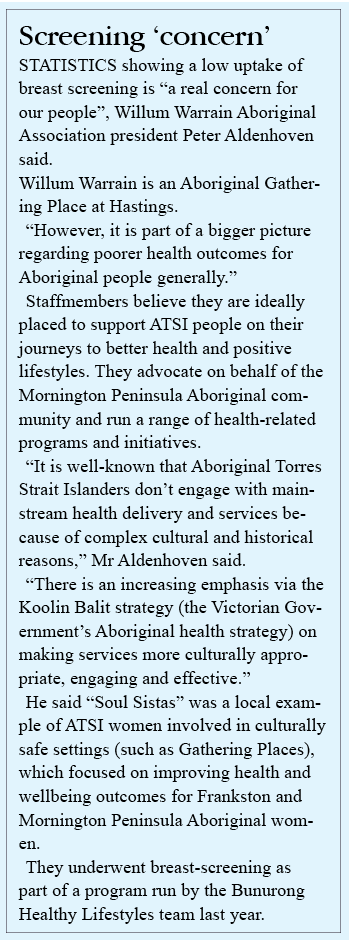 PART of the Closing the Gap report, released last Wednesday by Prime Minister Malcolm Turnbull, revealed an increase in Indigenous cancer mortality rates and a huge disparity in patient breast screening compared to non-Indigenous residents.
PART of the Closing the Gap report, released last Wednesday by Prime Minister Malcolm Turnbull, revealed an increase in Indigenous cancer mortality rates and a huge disparity in patient breast screening compared to non-Indigenous residents.
This finding follows a “concerningly low” rate of presentation by Mornington Peninsula Aboriginal and Torres Strait Islander women compared to other groups in the same age cohort.
Presentations by ATSI women at BreastScreen Victoria clinics at Frankston and Rosebud are well below the state average.
The Frankston’s presentation rate is just 19 per cent of the target age group (50-74), while Rosebud’s is slightly better at 26 per cent. Yet, for non-Indigenous women, the Frankston presentation rate is 51 per cent and Rosebud 54 per cent. The state average is 54 per cent.
Spokeswoman Jane Aubrey said BreastScreen Victoria works with Willum Warrain Aboriginal Association to engage the ATSI population, however, she said presentation numbers are still “concerningly low”. Presentations are held at the Rosebud clinic.
The Closing the Gap report states that: “Between 2006 and 2013, there was a 10 per cent increase in cancer death rates for Indigenous patients and a 6 per cent decline for non-Indigenous Australians.”
“Breast cancer is the most common cancer among indigenous women in Victoria,” Ms Aubrey said.
“Working with key indigenous groups, particularly the regional Aboriginal Community Controlled Health Organisations (ACCHOS), has been crucial to gain an understanding of how best to engage with the communities.
“Not only is breast cancer the most common cancer among Aboriginal and Torres Strait Islander women, but the mortality rate is also higher due to diagnosis at advanced stages – something BreastScreen Victoria is actively working to change.”
Prime Minister Turnbull called for “hope and optimism rather than entrenched despair” in engaging with indigenous Australians and this is a sentiment shared by BreastScreen Victoria.
Its CEO, Vicki Pridmore, said the testing “continues to improve outcomes for Aboriginal and Torres Strait Islander women with participation rates improving through implementation of a considered, culturally sensitive program which aims to make the screening process easier”.
“It’s important to remember that early detection of breast cancer improves outcomes for women,” she said. “Three quarters of all women diagnosed are over 50 and one 10-minute appointment every two years could save your life.”
See breastscreen.org.au or call 13 20 50.
